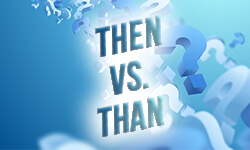
The words “then” and “than” are among the most commonly confused words in the English language, often misused due to their similar pronunciation. “Then” is primarily used to denote time or sequence, indicating what comes next or occurred in the past. On the other hand, “Than” is used to draw comparisons between different entities or concepts. A solid grasp of these words and their proper usage is essential for precise and effective communication.
Definition of “then vs. than”
Although “then” and “than” differ only by one letter but are used in different contexts, they represent some of the most often confused words in academic writing. The central difference between the two words is that “then” has a narrative aspect and “than” is used for comparisons.
Then
…is an adverb used to indicate a time, sequence, or consequence.
Than
…is a conjunction used to make comparisons.
Distinguishing between the two words, “then” and “than”, requires close attention to the context. If you’re referring to a specific moment or sequence of events, the appropriate term is “then”. Conversely, if your intent is to make a comparison between individuals or things, the correct word to use is “than”.
Using the word “then”
The word “then” can be used in different ways, as outlined in the following.
“Then” as an adverb
The word finds utility in diverse contexts, and in the following, you will gain a more profound understanding of its varied applications.
- When referring to time: “Then” can be used to explain a particular time (past or future).
- When expressing a sequence: The term “then” can be employed to describe one action succeeding another, indicating a sequence of events.
- As a form of consequence: The term “then” can also be utilized to elucidate the result of a scenario that occurred in the past.
Tip for using “then” correctly
Substituting the adverb “then” with other words that have the same meaning may be a useful way to check if you are using it correctly. Synonyms for then are “afterward”, “subsequently”, “next”, or “at that time”.
Using the word “than”
The word “than” can be used in different ways depending on the context, as outlined in the following.
“Than” as a conjunction
The word “than” can typically be used as a conjunction. The word “than” is used to introduce a sentence that indicates a comparison between two or more entities or units.
“Than” as a preposition
The word “than” can typically be used as a preposition. “Than” follows an adjective or adverb and is employed to compare the second element with the preceding one.
Tip for using “than” correctly
Substituting “than” with other words that have the same meaning may be a useful way to check if you are using it correctly. Synonyms for effect are “compared to”, “in contrast to”, “in comparison to”, or “rather than”.
Test yourself!
Practice sheet
Test your understanding of distinguishing “than” from “then” by filling in the blank spaces in the 10 sentences. You can then find the correct answers in the second tab to check if you grasped the right understanding.
1. I finished my homework, and ____ I went to bed.
2. She is taller ____ her sister.
3. He prefers pizza rather ____ pasta.
4. First, we’ll go shopping, ____ we’ll have lunch.
5. It’s better to be early ____ late.
6. The movie was more exciting ____ I expected.
7. He would rather read a book ____ watch TV.
8. If it’s raining, ____ we should bring umbrellas.
9. She was younger ____, but now she’s older.
10. He ran faster ____ all the other competitors.
1. I finished my homework, and then I went to bed.
2. She is taller than her sister.
3. He prefers pizza rather than pasta.
4. First, we’ll go shopping, then we’ll have lunch.
5. It’s better to be early than late.
6. The movie was more exciting than I expected.
7. He would rather read a book than watch TV.
8. If it’s raining, then we should bring umbrellas.
9. She was younger then, but now she’s older.
10. He ran faster than all the other competitors.
in Your Thesis
FAQs
The key difference is that “then” is primarily used to indicate time, sequence, or consequence, while “than” is used to make comparisons between entities.
This may help:
- “Then” goes with “when.”
“When does B happen?” “A happens, then B happens.” - “Than” goes with “that.”
“This is better than that.” - Then is when, than is to compare a hen.
“Then” describes a specific time, indicates a sequence or order of events, or expresses a logical consequence.
“Than” is used when making comparisons between two or more entities, highlighting a difference in quantity, quality, or relation between them.
To help remember the difference, you can try creating simple mnemonic devices:
- For “then,” think of it as related to “when.” Both “then” and “when” refer to time or sequence.
- For “than,” think of it as related to “comparison.” Both “than” and “comparison” involve making comparisons.
Practice is also essential in solidifying the correct usage in your mind. Read and write sentences using “then” and “than” to get a better feel for when to use each word.
